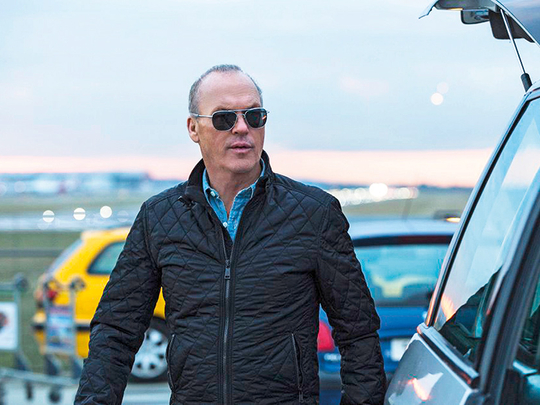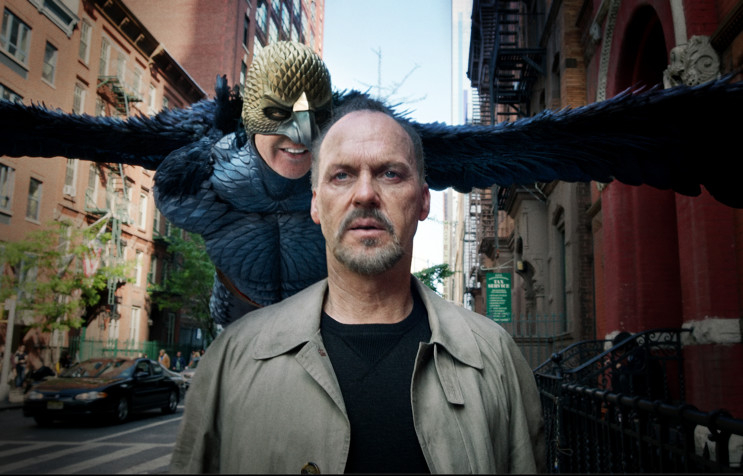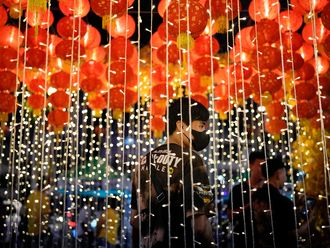
The thick black curls that helped make Michael Keaton look so manic in all those 1980s comedies, and which he then tore at as a tormented Bruce Wayne in Tim Burton’s Batman movies, are long gone; but the satyr-like eyes are unchanged. As he walks into a London hotel room on a grey Saturday morning, holding a cup of coffee, he looks strikingly different from the man I have spent four decades watching on screen: he has the trim, spry build of a wiry woodsman rather than a 66-year-old actor, thanks to half a lifetime spent in rural Montana, fishing and hunting.
His walk is reminiscent of a rooster’s strut, with his chest puffed out and a bounce on his toes; that swagger we saw in 2014’s Birdman, for which Keaton won a Golden Globe as the eponymous former superhero actor, was not a put on, it turns out.
“Hadley, huh? My niece is called Hadley,” he says, shaking my hand, and embarks on a winding digression about Ernest Hemingway, whose first wife was called Hadley, and various Hemingway descendants whom Keaton has met over the years, and do I know them (I do not), and how I really ought to meet them. So was his niece named after Hadley Hemingway, I manage to ask.
“Huh? Oh no, I just think her mom liked the name,” he says, and he’s off again, talking about everything from whether or not he’s a liberal (he is, mostly) to why climate change shouldn’t be politicised. Keaton is not a straight Q&A kind of guy; his approach to conversation is a little like his eyebrows, looping in memorable and unexpected directions.
He has made a career out of taking the unpredictable route: you can never guess his next role, and then he never plays it the way you’d expect. In his breakthrough movie, 1983’s Mr Mom, Keaton played a stay-at-home father at a time when such a concept was almost unheard of, and he played him as a man who has no idea how to do any of the stereotypically masculine jobs around the house; when asked if he’s rewiring the house with 220 volts, Keaton adlibbed, “220, 221, whatever it takes”.
He was the dazzlingly frenetic lead in Tim Burton’s Beetlejuice, a largely improvised performance opposite fellow ghosts Alec Baldwin and Geena Davis. With Burton again, he played Batman as a conflicted nerd, rather than a grinning muscle man. In Birdman, he plays an actor so neurotic, he ends up running through Manhattan in his underwear.
He surprises me today by arriving with a big grin, which is unexpected in a man who has never made any secret of his dislike of interviews: you don’t move to the middle of Montana at the peak of your celebrity if you enjoy being the centre of attention. But he is clearly having a ball on this, the second wave of his career. Since Birdman, he has played the editor of the Boston Globe in the 2015 ensemble movie Spotlight, which won a Best Picture Oscar; and he was a curveball choice as Ray Kroc, the man who turned McDonald’s into a franchise, in 2016’s too-little-seen The Founder.
“It’s all fun, man,” Keaton says, “and at a point when you don’t have anything to prove? Yeah. We’re all here for a millisecond, so how bad can this be?” he says, his drawn-out vowels (“maaan”, “baaad”) revealing his Pittsburgh origins. This month, he plays a CIA special ops trainer, Stan Hurley, in the Bourne-esque American Assassin. Hurley is training up a new damaged-but-brilliant recruit (Dylan O’Brien), who wants to kill Middle Eastern terrorists after they killed his girlfriend. Keaton’s crazy eyebrows are put to good use as the on-the-edge mentor, but it is a somewhat baffling choice for him: the movie is undeniably generic for an actor who has always eschewed straightforward genre. But maybe this is just another of Keaton’s surprises?
“Yeah, exactly, and not to be cute or ‘cheeky’, as they say” — he switches mercifully briefly into an appalling English accent — “but that’s what keeps me interested. My boredom level is fairly low. And that’s too bad, but that’s the way it is, and this genre, a committed action thriller movie, was just different for me. A change.”
I don’t get the impression it’s a change he’ll necessarily repeat. When I mention one particularly intense scene, he shrugs: “I think I’m OK in it. I’d like another shot at it, but the director wanted to turn the volume up. You have to ask yourself, ‘OK, what kind of movie is this? It’s an action movie. OK.’ You have to buy into the programme.”
After becoming known for his hyper-comedic performances in the early 1980s, Keaton switched to dramatic roles — first as a recovering drug addict in Clean And Sober (a flop) and then as Batman (one of the biggest box office hits of its day). In the space of five years, he went from total unknown to household name. He also got married, to actor Caroline McWilliams, and had a son, Sean. Can he even remember any of that presumably pretty overwhelming decade?
“Not really, no, and that’s a good way of putting it: married, house, kid right away, career, a lot of attention, which is not something I’m crazy about. I don’t hate it, but it’s never my first choice. It was mostly good,” he says. He and McWilliams divorced in 1990.
Keaton’s Batman completely changed the way superheroes were portrayed in Hollywood movies, coining the reluctant, self-loathing alter ego that is still de rigueur 30 years later (Christian Bale’s Batman, Andrew Garfield’s Spider-Man, almost all of the X-Men ). But he was a controversial choice and fans bombarded the Warner Bros studio with furious letters, insisting Keaton was too weird and weedy, not understanding that this was exactly why Burton cast him: “He’s got all that wild energy in his eyes, which would compel him to put on a bat-suit... He does it because he needs to, because he’s not this gigantic strapping macho man,” Burton later said.
I interviewed Burton a few years ago and, meeting Keaton, it is obvious why the two men feel such an affinity (they are currently working together again, on Burton’s live-action remake of Dumbo). Although Keaton isn’t as outwardly eccentric, he has a similar tendency towards unmediated stream-of-consciousness responses, and blunt plain-speaking — both the opposite of slick Hollywood schmooze. It must have been particularly hard for them, facing so much scrutiny during Batman, but Keaton insists he wasn’t aware of it — or not until he happened to pick up the business section of a newspaper and saw a cartoon of his face in an article suggesting that he, personally, would damage Warner Bros’ stock. “I truly didn’t understand why people cared one way or another, and I can’t believe people still care. I just thought, ‘I know what I’m doing, and I could be wrong, but in terms of what Tim and I discussed for the movie, I knew we were right on’,” he says now.
And they were: Burton’s first Batman film remains one of the most interesting big-budget movies ever made, with Keaton’s psychologically subtle performance a major part of that. But unlike Riggan, the Birdman character who becomes obsessed by his superhero alter ego, Keaton walked away, refusing to make Batman 3 when Burton wasn’t rehired as director. Was he also just sick of the bat-suit by then?
“[The film] just wasn’t any good, man. I tried to be patient, but after a certain point, I was like, I can’t take this any more, this is going to be horrible. But, look, there was some really horrible taste in the 90s, and I probably contributed to that, unfortunately. It was a time of nouveau riche excess — everyone was known for their jets and their stuff. And I thought, I’m in this job for the long run, I don’t want this. And the truth is, I’m not boasting, but I was correct. There are a whole load of people who ran things that are long gone.”
Joel Schumacher’s two Batman movies were notoriously terrible, starring first Val Kilmer and then George Clooney. A few years later, Keaton had a cameo as a detective in Steven Soderbergh’s Out Of Sight with Clooney. Did they swap bat tales?
“I didn’t,” he says, “but he used to shout at me, ‘Hey, the brotherhood!’ And I’d go, ‘Hey!’ But I had no idea what he meant. Swear to God! And he did it a bunch of times: ‘Brotherhood!’ And then someone explained it to me and I was like, ‘Ohhhhh!’ I mean, I think I’d forgotten he was in [Batman].”
After Batman, Keaton took a series of notably unstarry roles — a tenant from hell opposite Melanie Griffith and Matthew Modine in Pacific Heights, a hammy Dogberry in Kenneth Branagh’s Much Ado About Nothing. There was a run of comedies, including Harold Ramis’ Multiplicity, in which he played a man who clones himself, that were smart and funny, but never going to set the world on fire. Was he deliberately trying to get out of the shadow of the bat signal, or did he just like the scripts?
“It was both,” he says. “I do what interests me.” So he would never do anything just for the money?
“Look, it’s not like I don’t think about the business — I am cognisant of that side of things — but if you overthink the money part, you tend to mess it up. I actually thought [Birdman] might not work, but I also thought, even if it doesn’t work, I want to be a part of this kind of creativity. I want to be around this. It’s like making movies with Tim [Burton],” he says, those eyebrows rising in various directions. “Being around that is so much fun, you just want to be in that environment.”
After Out Of Sight, he pretty much disappeared for next 16 years. What happened?
“Look, there’s two different things here,” he says, leaning forward and tapping my knee, emphasising his points in a manner that feels more paternal than creepy. “There’s me taking a pause: I really like life, doing things, having a normal life. So there was that. And there was me getting bored, hearing the sound of my voice, seeing the same old tricks. So I may have lost interest, combined with a whole lot of people not knocking on my door. It wasn’t just me. But I also consciously started to slowly change things internally, and it worked.”
What does he mean by changing things internally? Dealing with the mental side of things? “Yeah, yeah. Just thinking about things, asking what you want, what you don’t want, how am I going to get to there? And it takes a lot of stumbling around, and it takes discipline.”
He spent those years hanging out in Montana, hunting with neighbours and walking in the woods. His family visited him, and there have been girlfriends (he is in a relationship now, but it’s the one subject he refuses to discuss), but in the main he was on his own. It’s the life, he says, that he dreamed of as a little boy.
Michael Keaton grew up just outside Pittsburgh, and his real name was and remains Michael Douglas; by the time he started acting, the other one had got there first. Did he ever tell him that he stole his name? Keaton literally spits out his coffee with laughter. “Kinda! Once we got something mixed in the mail, something from one of the [acting] unions, and I had to return it to him and we talked about it then. He’s a really nice guy, Michael, but it’s not even their name, I think?”
No, Kirk changed it from Danielovitch, I say. “Russian Jews, right? It’s funny.”
Keaton was the youngest of seven children in a working-class family, and they never went to the cinema because it was too expensive to buy tickets for all the kids. But he loved to watch old movies on TV, especially ones starring James Cagney and John Garfield. Was he drawn to acting because he was used to having an audience of siblings?
“Probably. I was talking about this with Colin Farrell the other day on the Dumbo set, actually, because he’s another youngest, and we youngests always relate to one another. You also get away with more, because by that point your parents are like, ‘Who’s that again? Oh, yeah, he’s cute, he’s been around a while’.”
He describes himself as a “weird” kid, but then corrects himself: “I mean, I don’t think I was weird. I’d be happy having me as a kid. I was a kid who liked adventure stories, who fantasised too much, who was extremely physically active. I had friends at school, but I wasn’t really social. I didn’t really like sleepovers — I liked sleeping outside.”
This gets him thinking about his son, Sean, now 34, when he was a boy. “He was just a really social little guy, so thoughtful and sensitive and practical, and always hanging out with friends, whereas I wanted to be on my own playing in the woods,” he says, his voice softening.
Presumably that’s because he had to fight for space, whereas Sean was an only child and happy to fill the house with friends? “Yeah, probably. He was always hanging out in groups and going to someone’s house, I remember that,” he says. After he and Sean’s mother divorced, Keaton moved to Montana. He dated Courteney Cox, and Michelle Pfeiffer, but never married again. I ask if it was strange having an only child when he grew up in such a big family.
“Not strange, exactly. I wished I’d had more, but then Sean told me he liked being an only child,” he smiles.
Sean Douglas is now a Grammy award-nominated songwriter who has worked with Madonna and Demi Lovato, and who is routinely referred to as “Michael Keaton’s hot son”. The two are often each other’s dates to award ceremonies: Sean came to the Golden Globes when his dad won for Birdman, and Keaton tearfully thanked him, calling him his “best friend”. When Keaton was last year added to the Hollywood Walk of Fame, Sean gave the speech: “I’ve seen everything from Batman to bath time when I was a young kid. I’m so proud to be your son. You’re my hero, my best friend and I love you so much.” Keaton, standing behind his son and moving excitedly from side to side, pinked with delight.
Initially, Keaton thought about going into comedy rather than acting, and you can still find some of his very funny standup routines online. The most striking thing about them is how little he has changed: on stage, he comes across as a nervy, neurotic fast-talker given to flights of surrealism. In one routine, he talks about how just a look from a stranger on the streets of New York can send him into therapy; in another, he imagines what it would be like if the cartoon strips that used to come with gum packets explored philosophical concepts. “My mom’s side of the family and my brothers and sisters are really funny — that’s the Irish Catholic side. My father’s side, the Scottish Protestant side? Not so much,” he says.
I tell him I always thought it was a shame he didn’t do more John Hughes comedies after Mr Mom. Keaton reels back in his chair, hands over his face. “Aw, man! Planes, Trains & Automobiles — that’s the movie I really wish I’d been in!” he says, citing the 1987 John Hughes classic starring John Candy and Steve Martin. “Do you remember when people would write off John Hughes and those movies he made?”
Actually, I say, I wrote a book about why those movies are the most important ever made. “Really?” he cries, bouncing out of his seat. A publicist comes in to tell us our time is up, but he waves her away. “Wait a minute, she’s really smart and I need to talk to her about this,” he says pointing at me, although I suspect this is more about John Hughes than my intellect. “I mean, if you look at the specificity of John Hughes’ direction in those movies, it’s incredible,” he continues. “These weren’t just cute little movies; these were about the economy, employment, unemployment, small towns. Man, you got me going on this!”
We spend 10 minutes nerding out over The Breakfast Club, before he thinks back to when he met Hughes while making Mr Mom: “I read the script and I thought, ‘Wow, this is really funny, this guy has something.’ And then I met John and I said, ‘You ought to direct this [too].’ But he said no, he was off to direct those movies starring people closer to your age,” he says, referring to the teen movies, which is sweet, because I am in my late 30s. “But, yeah, I would have loved to have worked with him. That would have been an experience.”
Michael Keaton, Brat Pack fan? The man truly is full of surprises.
–Guardian News & Media Ltd
American Assassin is now playing at cinemas in the UAE.













